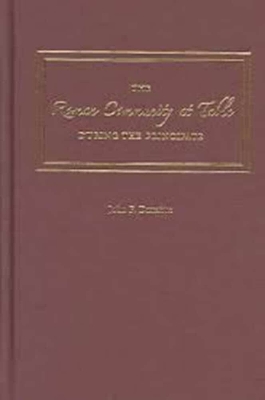This book is indispensable both for ancient history and for food history, since it sets the moralizing literature of the Roman republic and empire within the correcting frame of epigraphy to clearly reveal the ordering of status and gender at meal times. Donahue offers fascinating reflections on public and private dining, doing for Roman politics what Pauline Schmitt did for the Greek polis. The Roman Community at Table during the Principate brilliantly ties meal times into the practices of Rome's Hellenistic predecessors and richly reflects the religious and cultural contexts of eating. ---John Wilkins, University of Exeter ""Donahue gives a riveting account of Roman communal dining in the civic sphere. Assembling scattered, difficult evidence, and employing apt cross-cultural comparisons, he skillfully constructs a picture of an activity central to public life in the Roman west, and of its social, economic, and ideological consequences."" ---Matthew Roller, Johns Hopkins University Ranging from the extravagant banquets of the emperors to the numerous feasts in cities and towns throughout the Western Empire, John F. Donahue's new study examines public feasting in Rome during the first four centuries of the Common Era. Taking as its starting point the development of feasting in ancient Greece and then in Rome, this study brings to the fore the importance of the publicly shared meal in ancient culture and its particular significance within the Roman Empire. Previous studies have focused on the Roman feast largely for its structural and symbolic elements. Through a careful assessment of ancient evidence and modern comparative material, Donahue breaks new ground by focusing on the ""public"" banquet, allowing the exploitation of a broad range of literary and epigraphic texts. The resulting treatment provides the first comprehensive examination of areas such as festal terminology, the social roles of benefactors and beneficiaries, the kinds of foods offered at feasts, and the role of public venues in community banquets. Donahue's unique study relies on over three hundred Latin honorary inscriptions to recreate the ancient Roman feast. Illustrations depicting these inscriptions, as well as the food supply trades and various festal venues, bring important evidence to the study of this vital and enduring social practice. This book reveals the integral place of feasting in ancient culture as well as the unique power of food to unite and to separate its recipients along class lines throughout the Roman Empire. It will be of interest not only to classicists and historians of the ancient world, but also to anthropologists and sociologists interested in food and social group dynamics.
- ISBN13 9780472113897
- Publish Date 28 June 2004
- Publish Status Active
- Publish Country US
- Imprint The University of Michigan Press
- Format Hardcover
- Pages 352
- Language English
